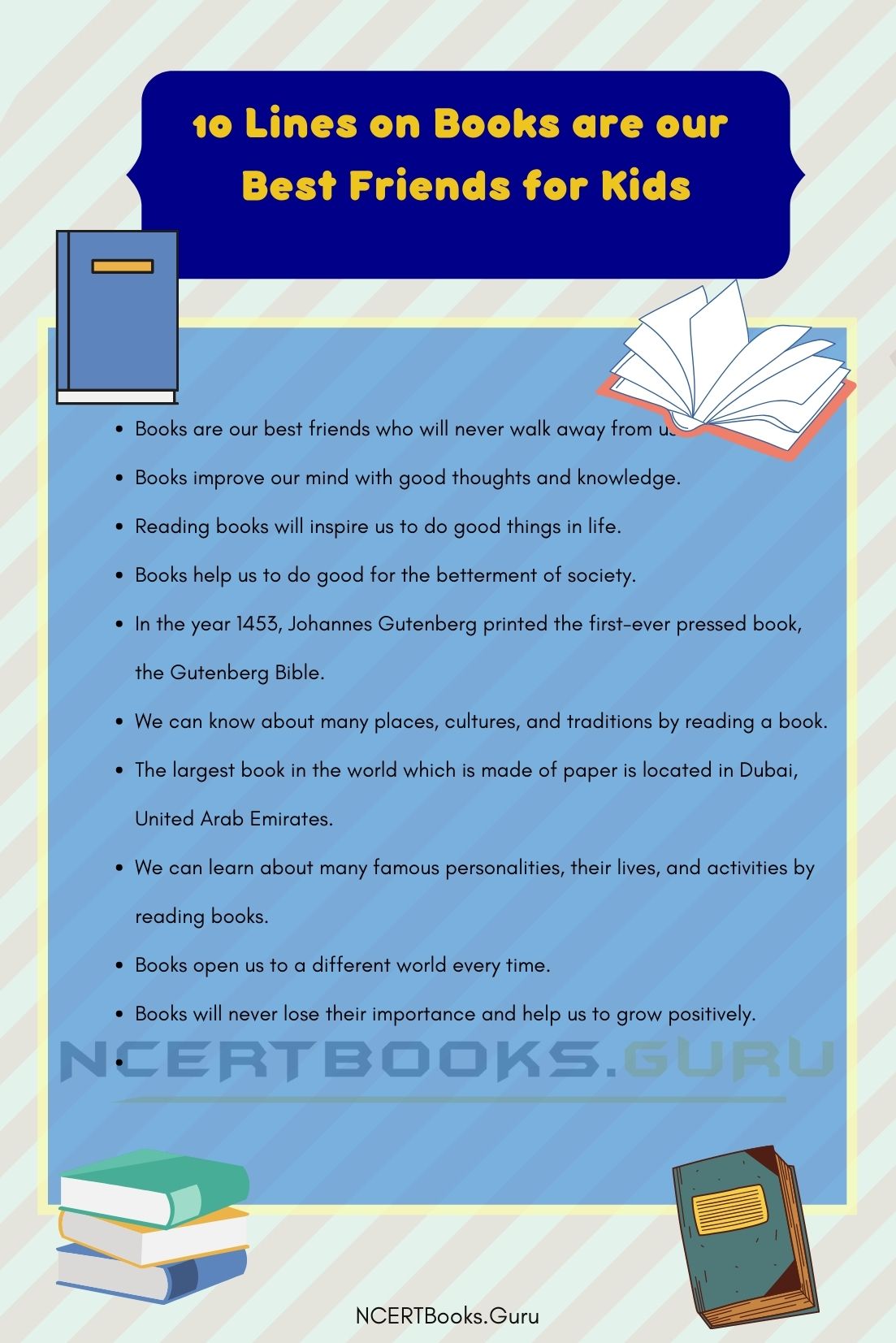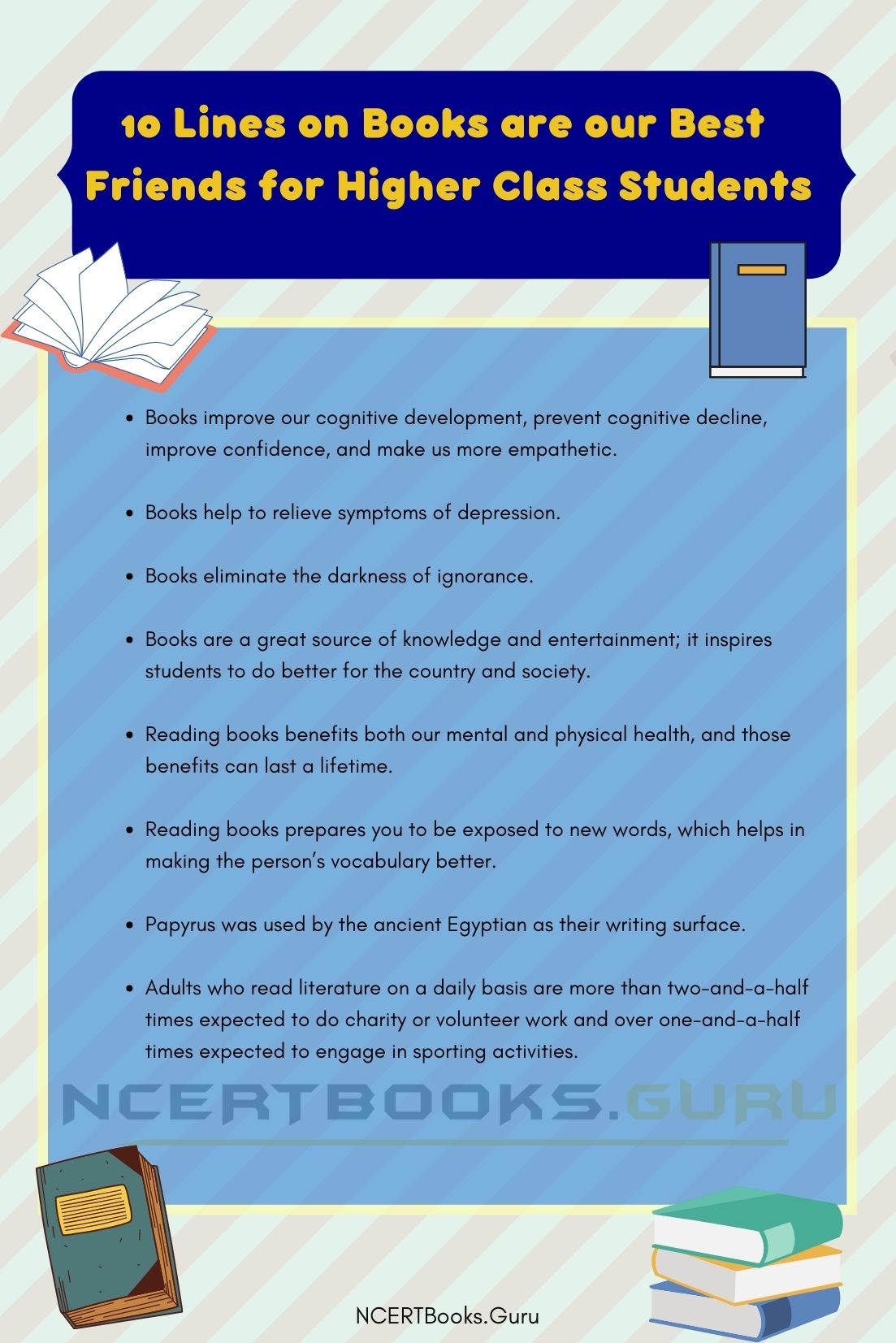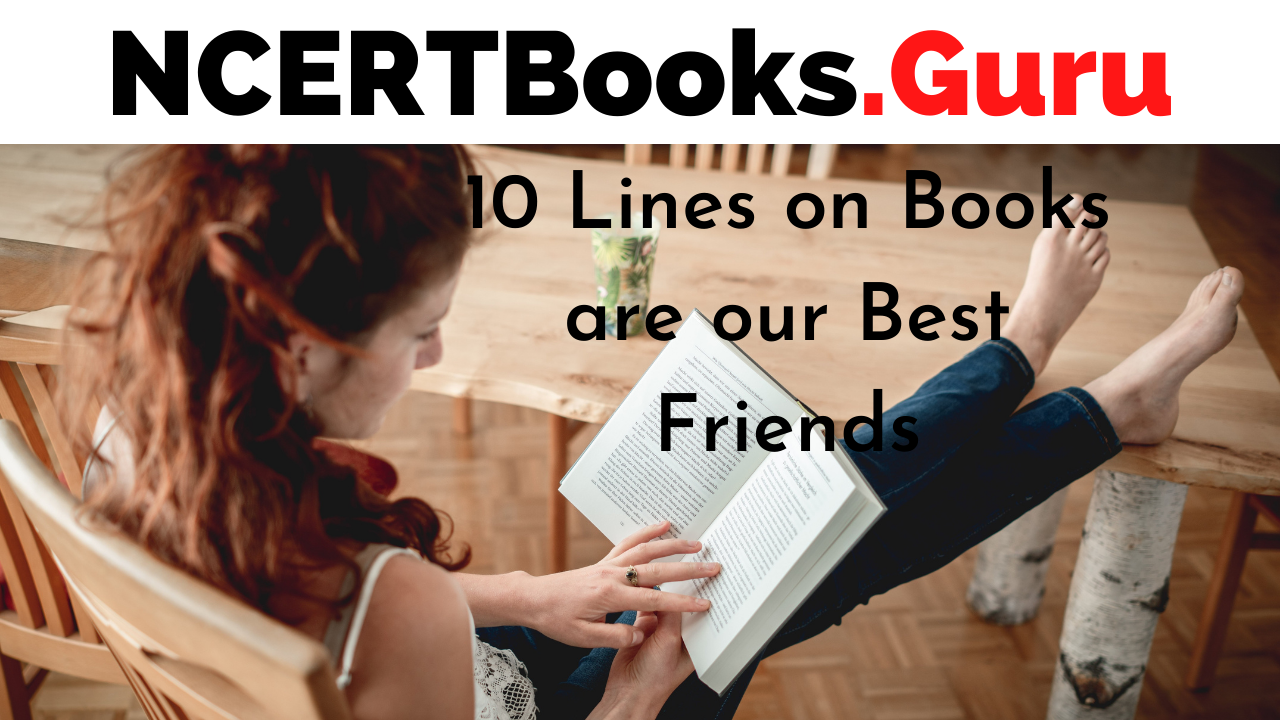10 Lines on Books are our Best Friends: Books are an important part of our life. They are the stepping stones towards knowledge. We are invariably dependent on books at every stage of our lives, be it in physical or digital form.
Books enhance our mind with knowledge and good thoughts, just like a good friend. Hence we can never feel lonely in the company of a book. The books’ history became an acknowledged academic discipline in the 1980s. Its main goal was to show that the book as an object, not just the text contained within it, is a communication channel between readers and words.
Books are of many kinds. They provide us knowledge and diversion. Good books exhibit many qualities in us. Extensive reading makes a man, a man of culture. They make our life happy. They take us to places; we never saw, the height we never felt, and to the land we never imagined; if we want to choose a best friend for our life then, it’s time to select books as our best friend because books can provide us companionship in our best and worst time and teach us a lesson.
Enhance your vocabulary and writing skills with 10 Lines Essays available. Spark up the creativity in you and access various Topics on 10 Lines all in one place.
Set 1 – 10 Lines on Books are our Best Friends for Kids
Set 1 is considerate for students belonging to classes one, two, three, four, and five.
- Books are our best friends who will never walk away from us.
- Books improve our mind with good thoughts and knowledge.
- Reading books will inspire us to do good things in life.
- Books help us to do good for the betterment of society.
- In the year 1453, Johannes Gutenberg printed the first-ever pressed book, the Gutenberg Bible.
- We can know about many places, cultures, and traditions by reading a book.
- The largest book in the world which is made of paper is located in Dubai, United Arab Emirates.
- We can learn about many famous personalities, their lives, and activities by reading books.
- Books open us to a different world every time.
- Books will never lose their importance and help us to grow positively.

Set 2 – 10 Lines on Books are our Best Friends for School Children
Set 2 is considerate for students belonging to class six, seven, and eight.
- Books broaden our vision and expand our interest in every field.
- Reading books help students to develop their vocabulary.
- The basic sorts of books are poems, dramas, novels, history, short stories, etc.
- Reading various books helps us appreciate the lifestyle and culture of different countries of the world.
- The International Book Number (ISBN) is the unique code of each book to distinguish it from the others.
- Reading books assists the growth of decision-making abilities, critical thinking, and the ability to analyse and solve problems.
- Paper made of goat and calfskin was used by the Roman civilisation for writing documents.
- Books have helped us flourish as humans in a significant manner.
- Reading books can change our brain and body for better development.
- Books are a knowledge storehouse. It can change our attitudes, our ideas, and our imagination.
Set 3 – 10 Lines on Books are our Best Friends for Higher Class Students
Set 3 is considerate for students belonging to class nine, ten, eleven, twelve, and Competitive Exams.
- Books improve our cognitive development, prevent cognitive decline, improve confidence, and make us more empathetic.
- Books help to relieve symptoms of depression.
- Books eliminate the darkness of ignorance.
- Books are a great source of knowledge and entertainment; it inspires students to do better for the country and society.
- Reading literary fiction or stories books explores the characters’ inner lives and develops a heightened ability to understand others’ feelings and beliefs.
- Reading books benefits both our mental and physical health, and those benefits can last a lifetime.
- Reading books prepares you to be exposed to new words, which helps in making the person’s vocabulary better.
- Papyrus was used by the ancient Egyptian as their writing surface.
- Bookmobile was a horse-drawn wagon designed to disperse good literature amongst the rural population
- Adults who read literature on a daily basis are more than two-and-a-half times expected to do charity or volunteer work and over one-and-a-half times expected to engage in sporting activities.

Frequently Asked Questions on Books are our Best Friends
Question 1.
Why are books important?
Answer:
Books are important in different ways; it allows readers to travel without going anywhere. It provides wings to children’s imagination. It gives joy, happiness, knowledge, wisdom, and the capability to transform life. Books improve cognitive development, prevent cognitive decline, and improve confidence.
Question 2.
What are the various kinds of books?
Answer:
Books are categorized as fiction or nonfiction. Within these two types of books, there are various genres. Some of the classes are poems, dramas, novels, history, short stories, satire, autobiography, etc.
Question 3.
When was the first bookmobile launched?
Answer:
In the year 1857, the first bookmobile was launched. It was a horse-drawn wagon designed to disperse good literature amongst the rural population and traveled between eight villages in the Cumbria County, in North West England. Philanthropist George Moore launched it in Great Britain in the 19th century.
Question 4.
When did the history of books become a recognised academic discipline?
Answer:
The history of books became a recognised academic discipline in the year 1980. Contributors to the discipline involve experts from the fields of textual scholarship, bibliography, codicology, philology, art history, paleography, and social history and cultural history. Its major objective is to illustrate that the book is a channel of communication between readers and words. It helped relating history to the present.
